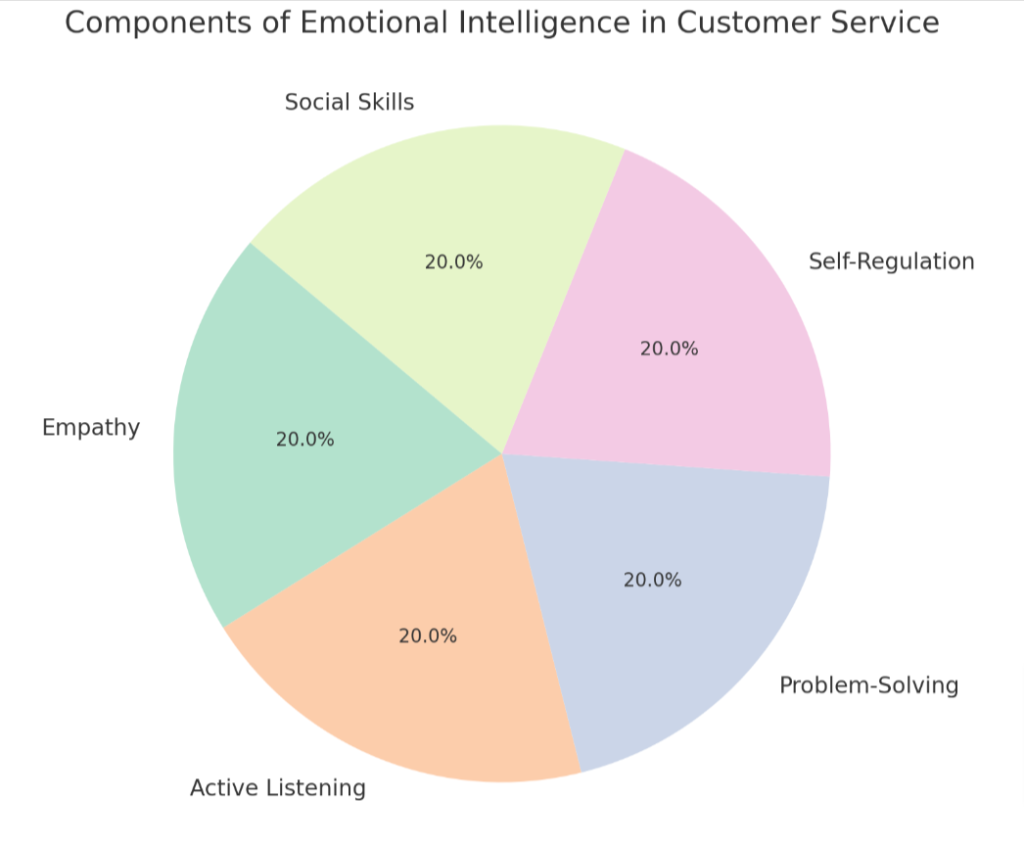Harnessing Emotional Intelligence for Enhanced Customer Interactions
Have you ever felt like you just didn’t connect with a customer? Believe it or not, emotional intelligence is key in 90% of top performers in the workplace. This article will explore ways to sharpen your emotional smarts for better interactions with every customer you meet.
Stick around – it’s easier than you think!
Key Takeaways
- Emotional intelligence is crucial for customer service, as it involves understanding and responding to customers’ emotions.
- Agents with high emotional intelligence can build better relationships by actively listening, showing empathy, and handling difficult situations well.
- Real – life examples include Starbucks focusing on personal engagement and Apple employees connecting emotionally in retail stores to enhance customer satisfaction.
The Importance of Emotional Intelligence in Customer Experience
Understanding emotions in customer interactions and being able to respond appropriately can greatly impact customer satisfaction and loyalty. Building strong relationships with customers requires a high level of emotional intelligence, especially in navigating challenging situations and demonstrating empathy.
Understanding emotions in customer interactions
Customers express a range of emotions during interactions, from joy and excitement to frustration and disappointment. Recognizing these emotional states can turn an ordinary conversation into a meaningful connection that fosters loyalty.
Agents with high emotional intelligence read verbal cues and body language to gauge feelings. This insight allows them to tailor responses, ensuring each customer feels heard and valued.
Handling emotions effectively is vital for problem-solving in the contact center environment. By staying emotionally present, employees show customers they care about more than just making a sale—they’re committed to providing solutions that meet emotional needs as well as practical ones.
Such genuine displays of empathy strengthen customer relationships, contributing to brand longevity and improved customer satisfaction rates over time.
Building strong relationships
Building strong relationships with clients hinges on recognizing and responding to their emotional needs. Emotional intelligence drives this process, unlocking the door to trust and loyalty.
It’s about more than just making a sale; it’s creating a bond that withstands challenges and nurtures positive feelings towards the brand.
Each interaction is an opportunity to demonstrate empathy and understanding, solidifying customer relationships. Consistently practicing empathy proves you value your customers as individuals, encouraging them to connect with not only a product but also the heart of the company.
This emotional presence in every conversation lays down the foundation for lasting loyalty and paves the way for brand longevity.
The role of empathy
Empathy goes beyond building strong relationships; it’s the heartbeat of every meaningful interaction with customers. It involves putting yourself in your customer’s shoes to truly understand their emotional needs and respond with genuine care.
Empathetic service agents create a supportive environment where customers feel heard and valued, paving the way for deeper trust and loyalty.
Incorporating empathy into customer interactions can transform an average experience into an exceptional one. Agents who demonstrate empathy are better equipped to resolve issues effectively, showing customers that their feelings and experiences matter.
This emotional connection not only solves immediate problems but also fosters long-term customer satisfaction and brand longevity.
Developing Emotional Intelligence for Better Customer Interactions
Enhancing active listening and communication skills is crucial in understanding and meeting customer needs. Navigating difficult situations with empathy and emotional awareness can strengthen customer relationships.
Active listening and communication skills
Developing active listening and communication skills is crucial for enhancing emotional intelligence in customer interactions. These skills involve:
- Paying full attention to the customer without interrupting, demonstrating genuine interest through eye contact and body language, and recalling key information.
- Using clear and concise language to convey empathy, understanding, and assurance to the customer, ensuring they feel heard and valued.
- Paraphrasing the customer’s concerns or needs to show active engagement and confirm understanding.
- Asking open – ended questions to gather more information and encourage the customer to express themselves freely.
- Summarizing the conversation at appropriate intervals to demonstrate comprehension and maintain a clear line of communication.
- Avoiding distractions such as side conversations or multi – tasking while engaging with the customer.
Understanding customer needs and expectations
Developing emotional intelligence begins with active listening and communication skills, enabling customer service representatives to understand the needs and expectations of their clients effectively. This is achieved through:
- Probing questions to gather insights into the specific requirements of each customer.
- Tailoring solutions that align with individual preferences, ensuring a personalized experience for each client.
- Anticipating potential concerns or desires based on previous interactions, providing preemptive support where possible.
- Seeking feedback and actively incorporating it into future interactions to continually improve service delivery.

Navigating difficult situations
Navigating difficult situations requires tact and emotional intelligence. It involves staying calm and composed while addressing challenging customer issues. To navigate such situations effectively, customer service representatives can employ the following strategies:
- Acknowledge the customer’s emotions without judgment or defensiveness, validating their concerns and demonstrating empathy.
- Offer proactive solutions that address the root cause of the problem, showing genuine concern for the customer’s well-being.
- Use positive language and tone to diffuse tension and build rapport, creating a supportive environment for problem-solving.
- Seek feedback from the customer to ensure their needs are met, actively engaging in two – way communication to find mutually agreeable resolutions.
- Empower employees with authority to make decisions within reasonable limits, enabling them to resolve issues promptly and efficiently.
- Provide ongoing training to equip staff with conflict resolution skills, emphasizing the importance of emotional awareness in managing difficult interactions.
Real-Life Examples of Emotional Intelligence in Action
Explore how leading brands have effectively utilized emotional intelligence to build strong, lasting customer relationships and create authentic experiences. Read on to discover the power of emotional intelligence in action!
Case studies of brands using emotional intelligence in customer interactions
Starbucks, a pioneer in emotional intelligence customer interactions, encourages its baristas to engage with customers on a personal level. By actively listening and showing empathy, they create an environment where customers feel valued and understood.
This approach has resulted in increased customer satisfaction and loyalty, positioning Starbucks as a brand that truly cares about its customers’ emotional needs.
Apple’s retail stores provide another compelling case study of emotional intelligence in action. Their staff are trained not only to solve technical problems but also to connect with customers emotionally.
Conclusion: Harnessing the Power of Emotional Intelligence for Authentic and Lasting Customer Relationships.
In conclusion, harness the power of emotional intelligence for authentic and lasting customer relationships. Develop active listening skills to understand and meet customer needs effectively.
Strengthen your brand’s relationship-building strategies through empathy and genuine emotional presence for long-term loyalty. Embrace emotional intelligence as the heart of successful customer interactions.

